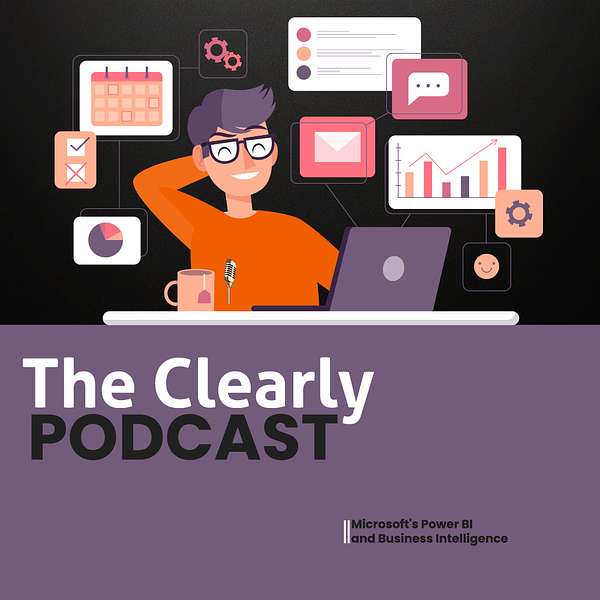
The Clearly Podcast
The Clearly Podcast
Getting Off the Excel Mindset
Use Left/Right to seek, Home/End to jump to start or end. Hold shift to jump forward or backward.
Welcome to the Clearly Podcast. This episode kicks off the new season with a discussion on transitioning organizations away from the Excel mindset. Excel is widely used for storing and managing data, but it’s not a structured tool and can lead to significant challenges in data projects.
Excel’s flexibility makes it easy for quick mock-ups and data input, but these solutions often lack consideration for data structure, security, and quality. Relying on Excel can also hinder scalability and precision, leading to issues like broken reports and security vulnerabilities.
The conversation highlights the need for a cultural shift within organizations, driven by top-down support. It's important to educate teams on the limitations of Excel and demonstrate the benefits of more advanced tools like Power BI, Power Apps, and structured databases. These tools offer better data management, security, and efficiency, freeing up time for more valuable tasks.
Despite the challenges, transitioning away from Excel is possible with the right approach. This includes clear communication of the benefits, managing expectations, and ensuring buy-in from senior leadership. While Excel can still play a part in data management, the goal is to use it in conjunction with more advanced solutions to achieve better overall data literacy and efficiency.
In summary, the podcast emphasizes the importance of moving beyond Excel to more structured data solutions, highlighting the benefits and strategies to achieve this transition within organizations.
You can download Power BI Desktop from here.
If you already use Power BI, or are considering it, we strongly recommend you join your local Power BI user group here.
To find out more about our services and the help we can offer, contact us at one of the websites below:
UK and Europe: https://www.clearlycloudy.co.uk/
North America: https://clearlysolutions.net/
Andy: Today we're excited for two reasons. First, the subject. Second, we have guests from Clearly Cloudy. Terry and David, could you introduce yourselves?
Terry: Sure, my name is Terry Hughes. I'm a project manager at Clearly Cloudy, but I handle various tasks.
David: My name is David. I manage consulting at Clearly Cloudy and consider myself a data enthusiast.
Andy: Great, thank you both. Today, we’re discussing how to get customers and organizations off the Excel mindset. This is a challenge we face regularly. Tom, can you explain what the Excel mindset is?
Tom: Excel is used everywhere for storing data, but it's not a structured way of doing so. The problem is people try to replicate Excel's functionality in other tools, which isn’t helpful because Excel isn’t designed for everything.
Andy: Shailan, what are the ramifications of relying on Excel for data solutions?
Shailan: Using Excel can lead to quick mock-ups, but these aren’t production-ready. They don’t consider volumes, users, security, or data quality. Structured environments offer better security and usability.
Andy: Terry, from a project management perspective, how does the Excel mindset affect projects?
Terry: It can be a hindrance because people used to Excel are reluctant to change. This makes implementing more structured solutions challenging.
David: A major issue is clients wanting Power BI to look exactly like Excel. They miss out on rich visualizations and the flexibility of more advanced tools. Changing data in Excel can also break reports, causing troubleshooting issues.
Andy: Tom, why don’t we just specialize in Excel solutions?
Tom: Excel has limitations like poor data type control, security issues, and scalability problems. Proper databases offer better data precision and security. We need scalable solutions that Excel can’t provide.
Andy: Have any of you worked on projects aimed at moving teams off Excel?
Tom: Yes, showing the benefits of structured data and reducing work can help, but it needs top-down support.
David: Flagging the issues with Excel at the start of a project and ensuring there’s an appetite for change is crucial.
Andy: Terry, have you had to make power apps look like Excel to ease adoption?
Terry: I've been lucky not to have that issue much, but managing expectations and showing clients what’s possible helps them move away from Excel.
Andy: So, is it realistic to get organizations off Excel? David, what do you think?
David: It’s a transformational process requiring cultural change. Highlighting the benefits and having senior-level buy-in is essential.
Terry: No, because Excel is ingrained from a young age and people are used to it. Even with better tools available, Excel remains a fallback.
Shailan: It’s about educating and guiding organizations. If there’s a top-down directive emphasizing security and efficiency, it’s possible.
Tom: Excel can still play a part in the future landscape. Showing how new tools complement Excel can help people see the benefits of moving beyond it.
Andy: Great discussion, everyone. Thank you, Terry and David, for joining us. We’ll be back next week with another topic. Goodbye.
Tom: Cheers, I’m off to update all spreadsheets.
Shailan: Goodbye.